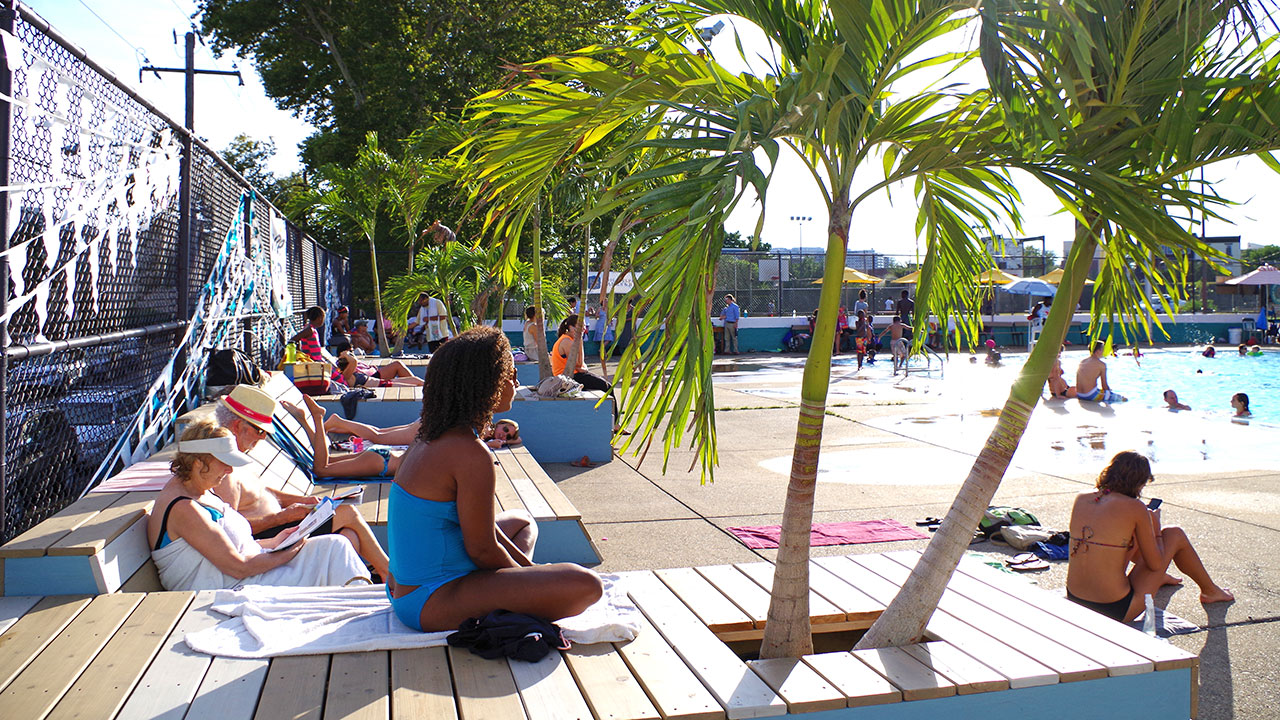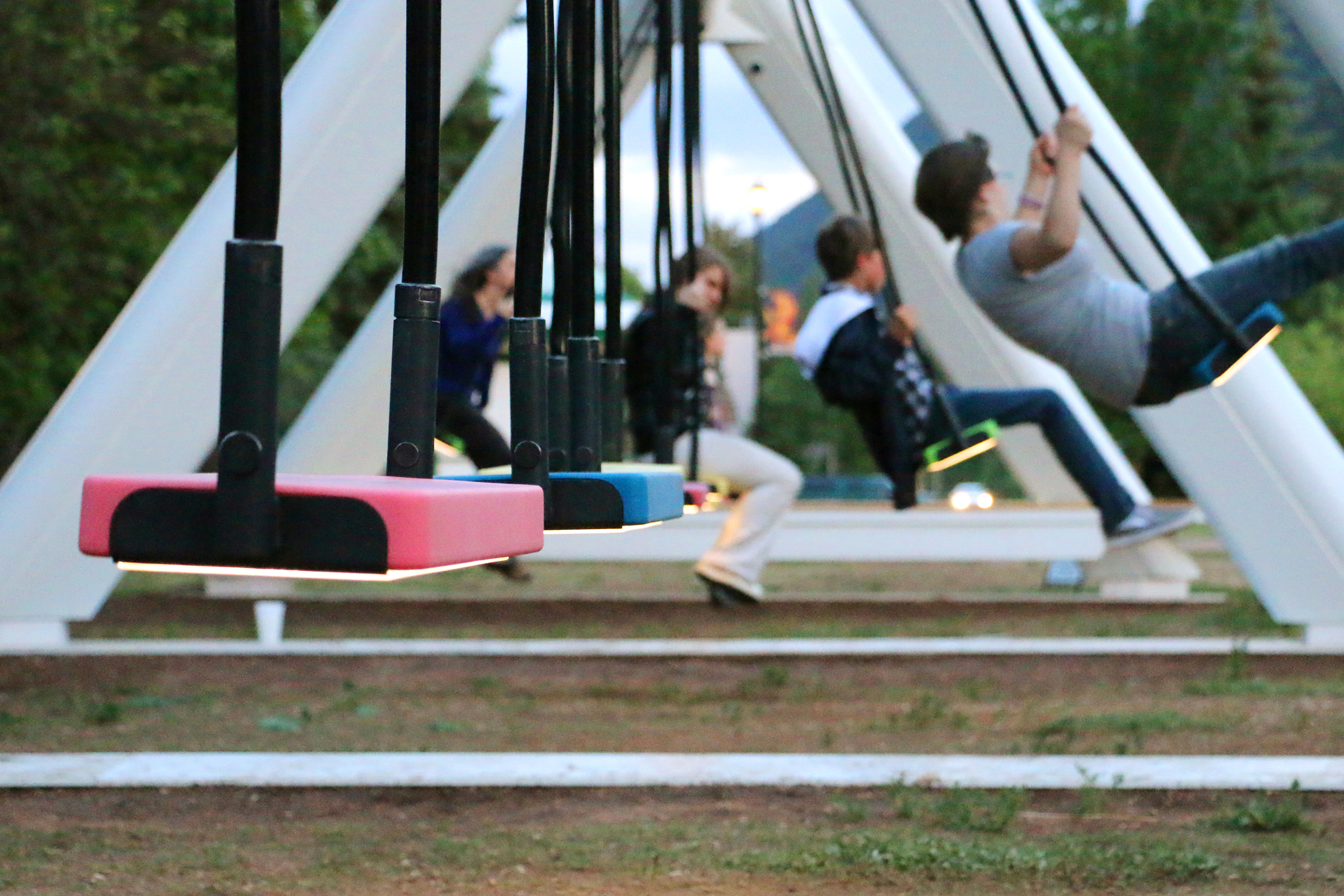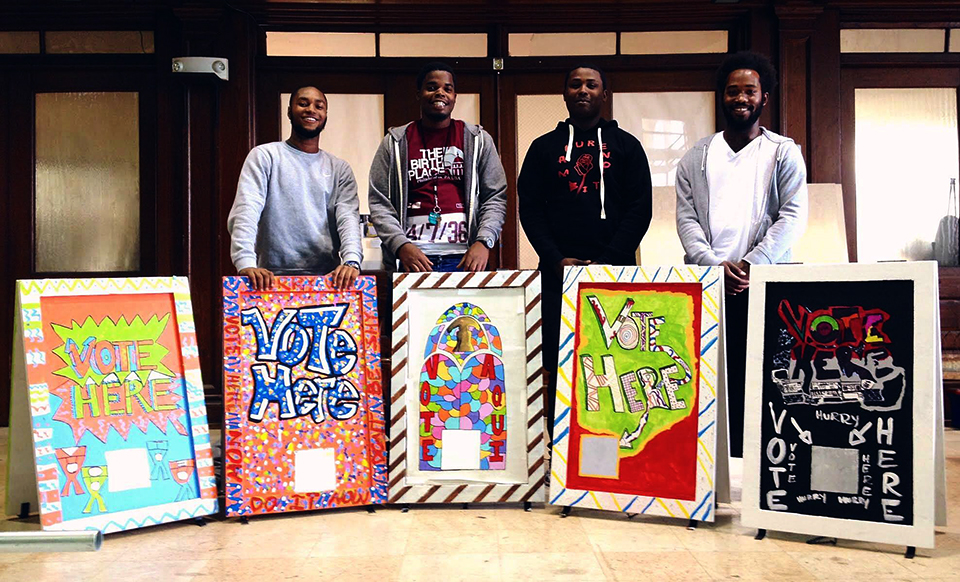
37 Knight Cities Challenge winners will share $5 million in funding
Above: The Pop-up Pools project in Philadelphia was a 2015 Knight Cities Challenge winner. Photo Courtesy The Pop-Up Pool Project.
We opened the second round of the Knight Cities Challenge in October with a little trepidation. We had been impressed by the enthusiasm for the first round of the challenge, which attracted more than 7,000 applications. We wondered if there would be the same interest the second time around. We had to turn down so many good projects—there were just 32 winners—we wondered if we would attract the same level of quality ideas.
The answer was a resounding yes. While we received “only” 4,500 applications this year, they were of a consistent high quality. We were thrilled with the number of innovative, creative and interesting applications that sought to advance talent, opportunity and engagement, what we see as the three prime drivers of city success.
We’re tremendously grateful to everyone who took the time to share their ideas with us.
The quality and strategic focus of the pool of applicants shows. After our readers read more than 500 applications each, we named 158 finalists, 32 more than last year. Today we’re proud to announce the 37 winning projects that will share $5 million in funding.
The winning projects are located in 19 of the 26 communities where Knight invests. This is a 58 percent increase from the 11 communities that had winning projects last year. We’re particularly excited to see the challenge provoke innovation and new thinking in Knight’s small and midsize markets.

The Swings, an interactive musical installation by Daily tous les jours, was a 2015 winner that is touring multiple Knight communities.
The challenge seeks to provide risk capital for new ideas. If projects are successful, we hope other risk-averse investors will provide the winners with access to more funds. A good example of this is the Pop-Up Pool Project in Philadelphia, winner of $297,000 in support from the 2015 Knight Cities Challenge. The Pop-Up Pool Project sought to remake Philadelphia’s public pools as places that brought people together across economic divides. After the pilot site proved successful in summer 2015, the city is considering expanding elements of the project across the entire pool system. Some neighborhoods are even trying to crowd-fund their own pop-ups.
This year the average grant size is $134,757, down about $20,000 from last year. Detroit has the highest number of winners with six winning projects ranging from neighborhood story tours by bike, to an engagement project that equips Detroiters with sensors to measure their urban surroundings. Philadelphia will receive the largest share of the funding with four projects for a total of about $875,000.
Three winners this year have previously been selected as K880 Emerging City Champions. The Emerging City Champions program, administered by 8 80 Cities and now open for applications, awards $5,000 microgrants to young civic innovators. It’s exciting to see the emerging talent pipeline as these civic innovators scale their ideas to larger projects.
While all of the winning projects focus on elements of attracting talented people, expanding economic opportunity and creating a culture of civic engagement, we also saw several additional themes.
The biggest category of projects revolves around the theme of restoring life back to public or vacant spaces. The economy was also a theme; specifically projects that aim to facilitate or prepare our cities for a changing urban economy were prominent. Together those two themes make up more than 50 percent of the winners. There were also clusters of projects around changing community narratives as well as bridging community divides. Finally, projects that seek to promote engagement and strengthen civic life were also well represented.

2015 Winner Next Stop: Democracy in Philadelphia. Photo by Conrad Benner, NSD.
Many of last year’s winners have experienced tremendous success, which means expectations for these 37 projects are high. We’re looking forward to seeing what they do and to learning from them in ways that will inform our work and improve our communities.
The Knight Cities Challenge will be back for a third round later this year. Meanwhile, you can follow our conversation around civic innovation at #knightcities.
Congratulations again to all of our winners. Thank you to the readers who helped us review the applications, and thank you to everyone who submitted an idea to make their city more successful.
George Abbott manages the Knight Cities Challenge. He can be reached via email at [email protected]. Follow him on Twitter @garthurabbott.
2016 Knight Cities Challenge Winners
Akron, Ohio
Cuyahoga Explore-a-foot by Brian and Tracy Davis | $70,000
Encouraging visitors to explore remote regions of Cuyahoga Valley National Park by providing services and amenities, such as help with travel arrangements and baggage transport, that make it more accessible.
Downtown Akron Innerbelt Bicycle Park by Jonathan Morschl | $120,000
Providing new life for an abandoned section of the highway by creating a “bicycle park” that promotes cycling, encourages new riders and attracts cyclists from throughout the region and nation.
Boulder, Colo.
Tree Debris to Opportunity by the city of Boulder | $200,000 | submitted by Yvette Bowden
Expanding economic opportunity for members of the community in need of new skills and careers by training them to turn debris from infested and diseased trees into furniture and art.
Charlotte, N.C.
CrownTownHall by the city of Charlotte | $85,000 | submitted by Jason Lawrence
Helping residents more easily connect with their local government and get involved with civic issues through pop-up events where they can meet elected officials, sign up for city services, and review area planning efforts.
Can Do Signs by the city of Charlotte | $27,900 | submitted by Sarah Hazel
Rethinking municipal signs that typically tell people “what not to do,” to spur fun, imagination and positivity throughout Charlotte; the project will create signs that provide amusing, enchanting, fun options: You can dance! You can sing! You can skip!
Queen City Quiz Show by Charlotte Is Creative | $85,000 | submitted by Tim Miner and Matt Olin
Creating a mobile quiz show that will team local musicians and artists with cultural groups to entertain, enlighten and challenge diverse communities with questions about the city from the trivial to the pertinent and controversial.
Columbus, Ga.
Evolving MidTown: Lot by Lot by the Incremental Development Alliance | $174,400 | submitted by Jim Kumon
Recruiting and training a diverse group of individuals on skills to become small-scale developers; participants will use distressed or underused lots as beta projects and receive access to investors and other resources.
Urban Glen | $4,000 | by the city of Columbus submitted by Phillip Trocquet
Creating “urban glens”—inviting spaces with trees, lights and hammocks—on vacant and overgrown lots to encourage people to meet and connect, while cleaning up city-owned properties.
Detroit
Pedal to Porch by Cornetta Lane | $30,000
Exploring Detroit’s untold history through monthly bike tours leading participants through different areas of the city and giving residents a chance to tell the story of their neighborhoods.
Dequindre Cut Market by the Detroit Riverfront Conservancy | $135,665 | submitted by Mark Wallace
Creating spaces for entrepreneurs to set up shop along the Dequindre Cut with shipping container pop-up shops that will add to the vibrancy of the neighborhood and attract new interest.
Detroit’s Pink Zone by the city of Detroit | $75,000 | submitted by Maurice D. Cox
Creating new opportunities for jobs and businesses by developing a new tool to streamline city development regulations and engaging design talent and developers to help reshape commercial districts.
Give a Park, Get a Park by the city of Detroit | $75,000 | submitted by Maurice D. Cox
Creating sustainable microparks in Detroit neighborhoods that are designed in response to community needs, require few resources and are easy to maintain.
Sensors in a Shoebox by the University of Michigan | $138,339 | submitted by Elizabeth Birr Moje and Jerome Lynch
Training youth to use sensors and data analytics that track environmental conditions such as traffic, noise or temperature in city neighborhoods; the project will help students answer questions about their community and build ideas to make it better.
The People First Project by Chad Rochkind | $184,080
Creating a network of tactical urbanists who collectively select a single urban challenge each year on which to focus quick, low-cost, creative improvements.
Ft. Wayne, Ind.
Tired-a-lot by Bridge of Grace Compassionate Ministries | $95,434 | submitted by Réna Bradley
Creating a design studio that will engage local youth to identify and create solutions to transform vacant lots in their neighborhood with low-cost materials.
Gary, Ind.
Steel City Salvage by Delta Institute | $385,000 | submitted by Eve Pytel
Establishing a reuse facility that would reclaim building materials, such as lumber, from vacant homes in Gary to contribute to economic growth, create jobs and support businesses, and provide opportunities for community collaboration on development projects.
Grand Forks, N.D.
New Flavors Food Truck by Pete Haga | $106,800
Offering new American residents access to a generic food truck and the equipment they need to start their own food service business or restaurant.
Lexington, Ky.
Phoenix Forward by the Lexington Public Library | $150,200 | submitted by Anne Donworth
Transforming Phoenix Park and Central Library into a place where children and families from diverse backgrounds can learn and play together; the project would involve complementary park and library programming and activities for families.
Parking Lot Diaries by the Lexington Downtown Development Authority | $87,200 | submitted by Jeff Fugate
Creating a living civic engagement lab in an underused area next to the Transit Center that tests and tracks temporary interventions and activities designed to add vibrancy to the area; the project will contribute to the city’s Town Branch Commons plan.
Long Beach, Calif.
Placemake the Vote by City Fabrick | $153,600 | submitted by Brian Ulaszewski
Developing a kit for creating temporary pop-up social spaces at voting polls in historically low voter turnout areas to encourage people to vote and provide venues to celebrate democracy afterwards.
The Outdoor Office by the city of Long Beach | $300,000 | submitted by Rachael Tanner
Transforming a portion of a public park into a space that encourages creativity, collaboration and productivity, and encourages residents to take work to the park.
Macon, Ga.
Pop-up Minimum Grid by NewTown Macon, The Macon-Bibb Urban Development Authority and Macon-Bibb Government Department of Parks and Beautification | $151,900 | submitted by Josh Rogers
Creating a pop-up minimum grid that would allow citizens to explore their city safely on foot or on bicycles; the project would expand a trail system from the river to downtown and the surrounding neighborhoods.
Miami
Biscayne Green by the Miami Downtown Development Authority | $145,000 | submitted by Fabian de la Espriella
Creating a pop-up park and urban forest along Biscayne Boulevard to drive momentum for “Biscayne Green,” a proposal to redesign Biscayne Boulevard to include a pedestrian promenade.
Miami Civic User Testing Group by Code for Miami | $100,000 | submitted by Rebekah Monson
Ensuring that people building local government technology use real-world feedback throughout the development process by creating a user testing group that will identify user experience issues more quickly, while making websites and apps more accessible.
The Underline: Brickell Backyard by Friends of the Underline | $250,000 | submitted by Meg Daly
Creating a sports field and gym as part of The Underline, a proposed 10-mile linear park underneath the Miami-Dade Metrorail, to provide quality of life incentives to talented young adults.
Milledgeville, Ga.
The Democracy Lab by the Twin Lakes Library System | $25,000 | submitted by Stephen Houser
Creating a shared space in downtown Milledgeville, located next to City Hall and near a makerspace and a library, that will foster civic engagement through public events, meetings that gather residents and leaders to problem-solve, and resources that better connect civic institutions.
Palm Beach County, Fla.
The Sunset Rises Again by West Palm Beach Community Redevelopment Agency | $171,650 | submitted by Jon Ward
Creating a new cultural destination in the Historic Northwest District of West Palm Beach on the site of the Sunset Lounge, a former prominent jazz club and surrounding land.
Philadelphia
20 Book Clubs, 20 Co-op Businesses by Philadelphia Area Cooperative Alliance | $146,000 | submitted by Caitlin Quigley
Increasing civic engagement and economic opportunity by launching book clubs in 20 Philadelphia neighborhoods for participants to study cooperative businesses and then form their own.
Breaking Bread, Breaking Barriers by Reading Terminal Market | $84,674 | submitted by Anuj Gupta
Building cultural bridges to Philadelphia’s immigrant communities with cooking classes celebrating ethnic food operated by chefs from Reading Terminal Market.
The Institute of Hip-Hop Entrepreneurship by Little Giant Creative | $308,640 | submitted by Tayyib Smith
Increasing economic opportunity by using hip-hop to provide hands-on business training to members of low-income groups.
The Little Music Studio by Group Melvin Design | $334,050 | submitted by Ben Bryant
Breaking down community barriers with The Little Music Studio, a traveling playground for musicians.
San Jose, Calif.
Post Street Night Market by Justin Triano | $100,000
Expanding economic opportunity with a recurring night market that features local crafts, food and entertainment.
The MayFeria by Mexican Heritage Plaza | $100,000 | submitted by Tamara Alvarado
Increasing civic engagement and expanding economic opportunity in San Jose’s Mayfair neighborhood with The MayFeria, which will consist of folk life events, a community task force, and a coordinator to help identify and make better use of cultural and civic assets.
State College, Pa.
Community Collaborative Ice Luminary Project by The Make Space | $51,450 | submitted by John Stitzinger
Increasing civic engagement through a maker event that encourages residents to make ice luminaries, share the mold for the luminaries with their neighbors, and set a record by lighting up the town.
St. Paul, Minn.
I’m Going to Vote Today by Aaron Sackett and Christopher Bryan | $170,275
Testing a new way to increase participation in local elections by distributing stickers that read “I’m Going to Vote Today” to eligible voters to wear on Election Day.
Front Lawn Placemaking Platform by The Musicant Group | $82,400 | submitted by Max Musicant
Transforming front lawns from empty expanses of grass to vibrant places full of life through the development of a toolkit that encourages residents to create community hubs on their doorsteps.
Tallahassee, Fla.
The Longest Table by the city of Tallahassee | $57,250 | submitted by Michael Alfano
Building cross-community relationships with an expanded series of community conversations over meals in 100 homes.
Recent Content
-
Communities / Article
-
Communities / Article
-
Communities / Article


